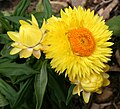Wikipedia:Today's featured article/requests/Xerochrysum bracteatum
Xerochrysum bracteatum
[edit]- This is the archived discussion of the TFAR nomination for the article below. Subsequent comments should be made on the appropriate discussion page (such as Wikipedia talk:Today's featured article/requests). Please do not modify this page.
The result was: scheduled for Wikipedia:Today's featured article/December 11, 2014 by BencherliteTalk 12:51, 3 December 2014 (UTC)
Xerochrysum bracteatum, commonly known as the golden everlasting, is a flowering plant in the daisy family Asteraceae native to Australia. It grows as a woody or herbaceous perennial or annual shrub up to a metre (3 ft) tall with green or grey leafy foliage. Golden yellow or white flower heads are produced from spring to autumn; their distinctive feature is the papery bracts that resemble petals. The species is widespread, growing in a variety of habitats across the country, from rainforest margins to deserts and subalpine areas. The golden everlasting serves as food for various larvae of lepidopterans (butterflies and moths), and adult butterflies, hoverflies, native bees, small beetles and grasshoppers visit the flower heads. The golden everlasting has proven very adaptable to cultivation. It was propagated and developed in Germany in the 1850s, and annual cultivars in a host of colour forms from white to bronze to purple flowers became available. Many of these are still sold in mixed seed packs. In Australia, many cultivars are perennial shrubs, which have become popular garden plants. Sturdier, long-stemmed forms are used commercially in the cut flower industry. (Full article...)
- Most recent similar article(s): last plant was Verbascum thapsus on Sep 11.
- Main editors: Casliber
- Promoted: 2012
- Reasons for nomination: pretty flowers....everything looks better decorated with pretty flowers....
- Support as nominator. Cas Liber (talk · contribs) 08:26, 29 November 2014 (UTC)
- Support, nice to add a spot of color. — Cirt (talk) 14:54, 29 November 2014 (UTC)

